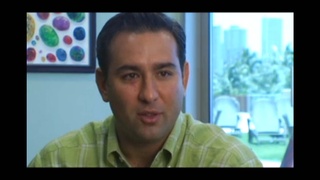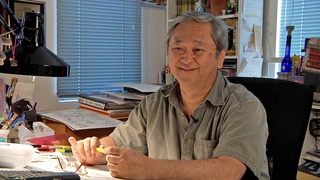Entrevistas
Grandfather's interrogations during World War II
It was clearly to me like most of the incarceration it was economics. He was a business leader and the Kibei thing was a huge part of it, the fact that he was educated there. I think there was also some confusion whether was he was Issei or Nisei because of that, in coming back to Hawaii from Japan because after Sand Island (and he spent several weeks there), they sent him on a tour of US Army Interrogation centers. I think he went to Wisconsin, Louisiana, somewhere in Arizona, before he came back to Hawaii.
Nobody never said anything about that, the only thing I remember my grandmother saying was that he came back thirty pounds lighter then when he left. And again these were interrogations. I’m sure they woke him up in the middle of the night, the whole bit, trying to figure out something, some tie to Japan. Anyway when he came back in Hawaii, later in the year of ’42, probably October/November, he told my grandmother that “for certain they’re gonna send me back to one of these concentration camps because they still considered me a threat.”
Data: April 25, 2018
Localização Geográfica: California, US
Entrevistado: John Esaki
País: Watase Media Arts Center, Japanese American National Museum
Explore More Videos

Resistindo à transferência de Jerome (Inglês)
(1919 - 2006) Veterano da Segunda Guerra Mundial e da Guerra da Coréia

Would do the same again
(1916-2010) Resistiu ao alistamento militar, ajudou a formar o Comitê Heart Mountain Fair Play

Uma visita ao Jerome após OCS (Inglês)
(1919 - 2006) Veterano da Segunda Guerra Mundial e da Guerra da Coréia

About Albert Chikanobu Kobayashi, Inc.
Homem de negócios havaiano, dono de empreiteira

Traumatic experiences before camp
(1913-2013) Obstetra no sul da Califórnia

“Everybody went in like sheep”
(1913-2013) Obstetra no sul da Califórnia

Going to camp with the Terminal Island people
(1927-2010) Ativista político


Interned at age fifteen, I saw camp as an adventure
(1927-2010) Ativista político



Crescendo no Japão (Inglês)
(n. 1930) Medio japonesa y creció en Japón y los Estados Unidos.

Recordações de Poston (Inglês)
(n. 1930) Medio japonesa y creció en Japón y los Estados Unidos.

Chegada em Poston (Inglês)
(n. 1930) Medio japonesa y creció en Japón y los Estados Unidos.

“A Low Tolerance For Injustice…”
(1938-2020) Advogada e ativista de direitos civis nipo-americana
